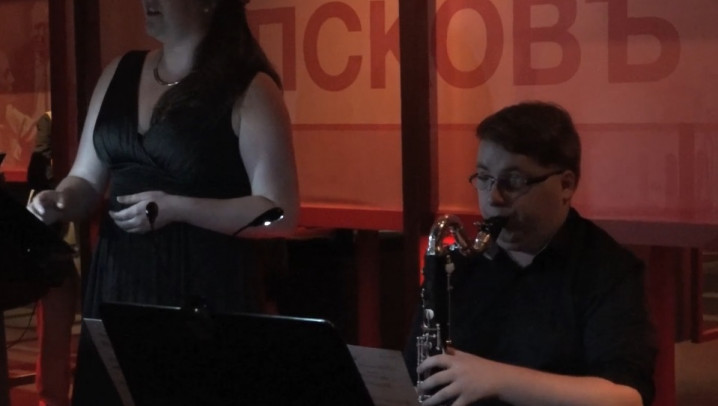
Strains of Revolution
Concert of the Clothworkers Consort of Leeds at the British Library, 27 June 2017.
| Genre | Concert performance |
|---|
The Clothworkers Consort of Leeds, cond. Bryan White
Programme
Di shvue (The oath), music by anon, arranged by Stephen Muir, words by S An-sky
Tehezakna (Strengthen our brothers), music arranged by Samuel Rubinstein, words by Hayim Nahman Bialik
In zaltsikn yam (In the salty sea), music by anon, arranged by Stephen Muir, words by S An-sky
In ale gasn – Hey, daloy politsey! (In all the streets – Down with the police!), music arranged by Zalman Mlotek, adapted by Stephen Muir, words anon.
A vinterlid (A winter song), music by Moses Pergament, words by Avrom Reyzen
Min hameytsar (From out of distress), music by Froim Spektor & Josef Gottbeter, words from Psalm 118: 5–24
Proletarke, shvester mayne (Proletarian woman, my sister), music by Samuil Polonski, words by Samuil Polonski
Poljuško, pole (Little field), music arranged by Gideon Klein, melody by Lev Knipper, words by Viktor Gusev
Viglid (Cradle song), music by Samuil Polonski, words anon.
Eyli, Eyli (My God, my God), music by Simon Parmet, words by Boris Thomashevsky & Jacob Sandler
Songs of brotherhood and strife
By the end of the 19th century, poor working conditions, and harsh persecution led many working class Russian Jews to socialism. A member of the Russian Socialist Revolutionary Party, the renowned writer-ethnographer S. An-sky (1863–1920) influenced supporters of the Jewish Labour Union, the ‘Bund’ (founded 1897).
An-sky’s revolutionary Yiddish poem In zaltsikn yam (1901) was a popular song among Bundists, and Di shvue (1902) became the anthem of the Bund. Most significant were An-sky’s expeditions documenting Jewish folklore. In ale gasn and Hey, daloy politsey (1905) were among Yiddish songs collected later by Soviet musicologists.
Whilst the Bund strove for Yiddish cultural autonomy, the Labour Zionists (founded 1906) yearned for a socialist future in Palestine. Based on a Hebrew poem by Hayim Nahman Bialik (1873–1934), the Labour Zionist anthem Tehezakna was arranged by Samuel Rubinstein (1886–1952), for the Helsinki Jewish choir.
At the outset of WWI, Finnish composer Moses Pergament (1893–1977) arranged A vinterlid by Bundist poet Avrom Reyzen, portraying the raging winds of time. The Revolution caused Pergament’s brother Simon (later Parmet; 1897–1969) to leave Russia for Helsinki; his Eyli, Eyli (1919) echoes the psalm ‘My God, why have you forsaken us?’, a meditation upon the massacres of Jews during the Ukrainian Civil War.
A similar reflective mood suffuses Min hameytsar by Froim Spektor (1888–1948) and Josef Gottbeter (1877–1942) of Rostov-on-Don. It was composed c.1924–25, as the Soviet regime’s anti-religious campaigns spread. Spektor fled to South Africa in 1928; Gottbeter was probably murdered during the Nazi occupation of Kislovodsk (1942). The Bund and the Labour Zionists fragmented into separate factions after the Revolution, and by 1930 were prohibited. But the Revolution lingered long in Jewish memory, and Czech composer Gideon Klein (1919–45) arranged the Red Army song Poljuško pole for male chorus in the Theresienstadt ghetto (1942).
The Soviet regime nevertheless fostered Yiddish and other national minority cultures. Proletarke, shvester mayne (rec. 1936) is attributed to Samuil Polonski (1902–55), who also composed Viglid at the height of Stalinist terror (1948). Ironically, even intellectuals and artists faithful to the legacy of the Revolution were murdered, and their Yiddish cultural institutions shut down.
© Simo Muir, Stephen Muir (2017)
| Curator | Stephen Muir |
| Curator | Simo Muir |
| Conductor | Bryan White |












